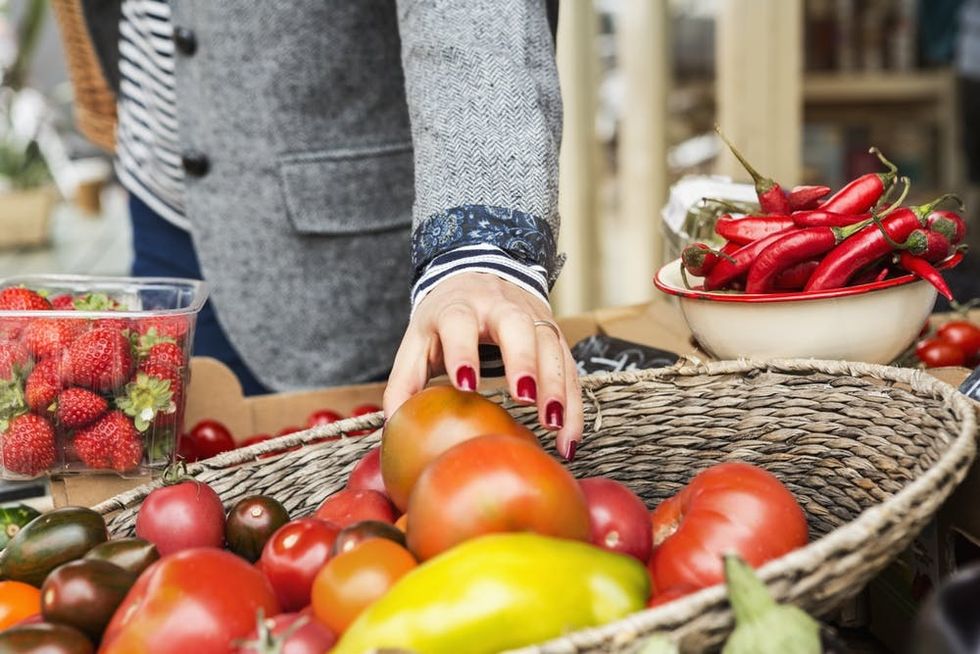How many hours have you wasted at the grocery store, trying to decide whether to spend a little more on organic coffee beans, produce, or granola bars? Sometimes there are ethical reasons to spend the extra money, such as when supporting a sustainable tea company that is carbon conscious. But if you go organic because it * sounds * healthier, we may have bad news. Before memorizing the “Dirty Dozen” organic guide, here’s what you need to know about shopping organic.
What does organic certification really mean?
“The USDA oversees a certification and labeling process in which foods labeled ‘organic’ must meet strict government standards,” explains Natalie Allen, RD and a biomedical sciences instructor at Missouri State University. The USDA Organic Seal can only be used when the ingredients in a product meet these standards. For example, certified organic farmers can only use pesticides from an approved list.
“The most important thing to remember is that ‘natural’ is not the same as ‘organic,'” says Allen. This is because there is no equivalent set of guidelines attached to the term “natural,” which could mean that a product was made without artificial ingredients, but could easily mean nothing at all.
Who buys organic products?
Denis Ring, who launched Whole Foods’ 365 Everyday Value line before founding OCHO Candy, says that last year, 80 percent of Americans had organic products at home. “Organic consumers want to avoid chemicals and additives that could be harmful; they want food that is safe, “he explains.
The big safety issue relates to pesticides. Hardcore organic advocates worry that the things used in conventional products could harm the environment and ourselves. Arguing for the other side, the scientists note that pesticides are tested to ensure their safety and are strictly regulated. (Some members of the organic team are also nervous about GMOs, which are also subject to strict control and, in some cases, allow farmers to use less pesticides and / or less water.)
Ring finds that new moms often buy organic food when they get healthy baby food. “They want to know who makes what they eat and what is inside,” he says. For many, the regulations around organic certification offer peace of mind.
Are organic foods healthier?
Lisa Booth, a registered dietitian and health advisor for 8fit, notes that the “certified organic” label can lull us into a false sense of nutritional security. “One of the biggest misconceptions is that ‘organic’ means ‘healthy,'” he says. “There are many processed foods like bars, baked goods, and candy that qualify as organic, but they contain a lot of sugar and are refined, which means that many essential and healthy nutrients have been stripped of them before they end up in your hands. “.
The same goes for organic products. “You will still get the same amount of healthy antioxidants, vitamins, minerals and fiber from your non-organic products,” says Brigitte Zeitlin, MPH, RD, CDN and owner of BZ Nutrition. “And you will continue to get the same protein from your dairy, eggs and meat / poultry.” When it comes to nutritional value, Zeitlin explains, organic foods are more or less identical to their non-organic counterparts.
But there are some factors that we have not yet figured out how to account for. “Some studies show that organic products contain more vitamin C, iron, magnesium and phosphorus, and less nitrates,” says Booth. However, he notes that current research is contradictory and inconclusive, and that it does not consider key factors such as soil quality.
So when should you focus on organic?
1. If you suffer from food allergies: “Organic can mean fewer ingredients, which could be helpful for someone with a severe food allergy,” says Allen. “But it is not absolutely necessary.”
2. When choosing animal products: “In general, I recommend that people buy organic animal products, such as eggs, dairy, poultry and meat, because the evidence shows they contain higher amounts of omega-3s compared to conventional growing options,” explains Booth. “Plus, they contain less hormones and antibiotics, so it’s better for your overall health to target organic, pasture-raised animal products whenever possible.”
3. If you have problems with your five a day: “Much of the organic focus is on fruits and vegetables, which are not normally consumed well,” says Allen. “The bottom line is that we want people to enjoy more products, eating a variety of different colored fruits and vegetables. Organic or not, your body will thank you. “
4. To support small and local producers: “The boom in packaged organic products has even helped drive consumer interest in local farmers markets,” Ring explains. He says the smaller, “more interesting” organic brands are gaining customers away from the larger manufacturers. Booth also notes that if you are looking for “nutrient-dense, low-pesticide products,” a community-supported agriculture (CSA) program may offer a less expensive route to buying organic produce, although it may not be certified as such.
5. If you have reacted to certain pesticides:Pesticide allergies are very rare (and in some cases, just a myth). But they have been logged, so if your doctor has confirmed an allergy to a (non-organic) pesticide, play it safe.
What are your best organic tips? let us know @BritandCo!
(Photo via Getty)
.


